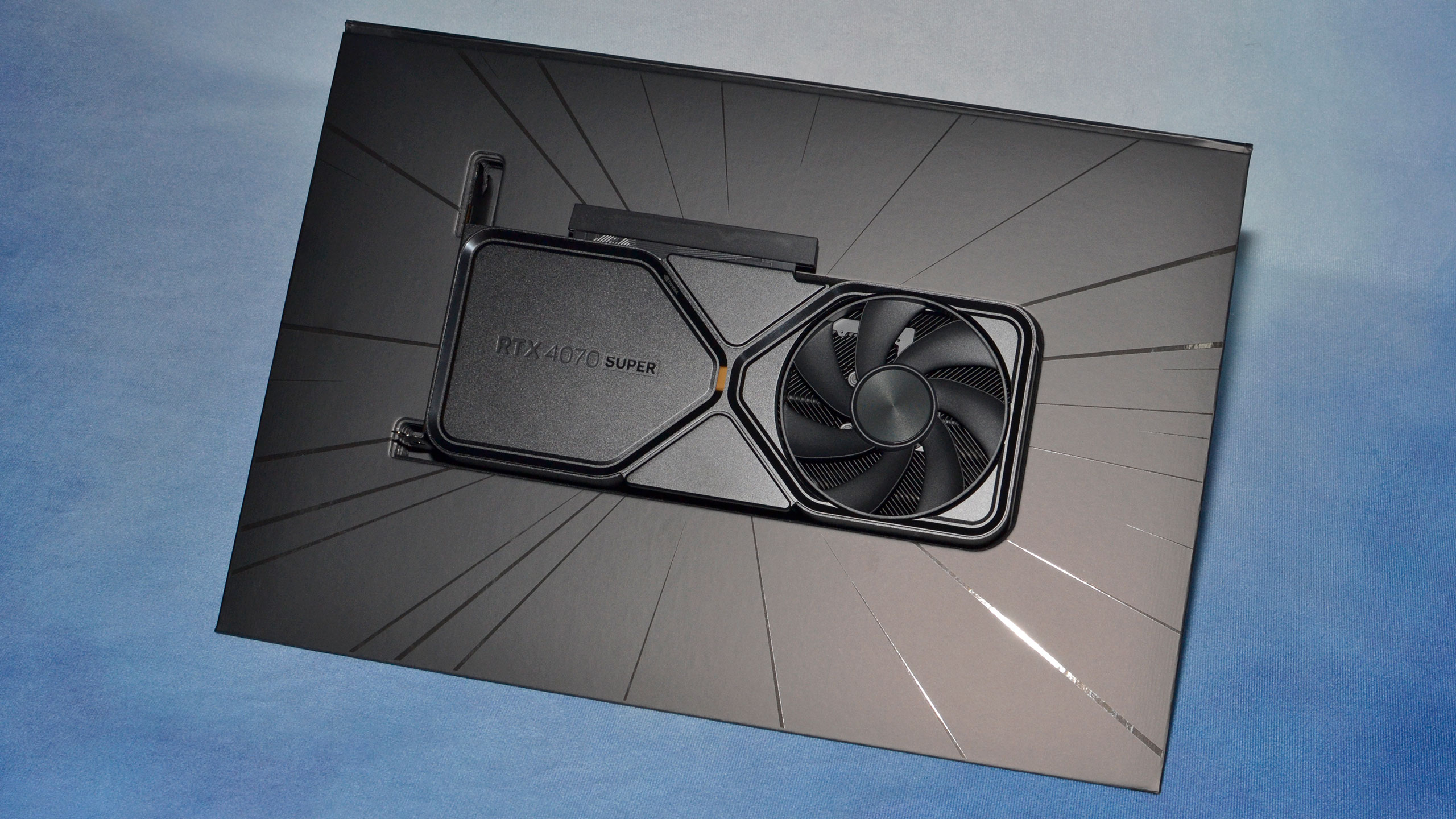Why you can trust Tom's Hardware
With a target price of $599, 1440p gaming makes the most sense on the RTX 4070 Super. High refresh rate 1440p monitors are also pretty ubiquitous these days, and make a good pairing with "mainstream high-end" graphics cards like this. So, we'll start with our 1440p results.
We have 15 games and 18 charts, with the "high level overview" showing the geometric mean across all 15 games. Then we break things into rasterization and ray tracing test suites. Many will make the argument — and they're not wrong — that the performance hit from ray tracing doesn't match up with the improvement in rendering quality. Even in fully path traced games like Cyberpunk 2077 and Alan Wake 2, you basically need upscaling and often frame generation just to hit reasonable levels of performance. So, weigh things in your own mind as you see fit.
We do have three "bonus" games that we're also testing, using Quality upscaling as our default in two of the games. Those results aren't included in our overall charts, as we haven't fully tested these games on all of the GPUs for this review, but they do help inform our view of how more demanding games in the future may run.
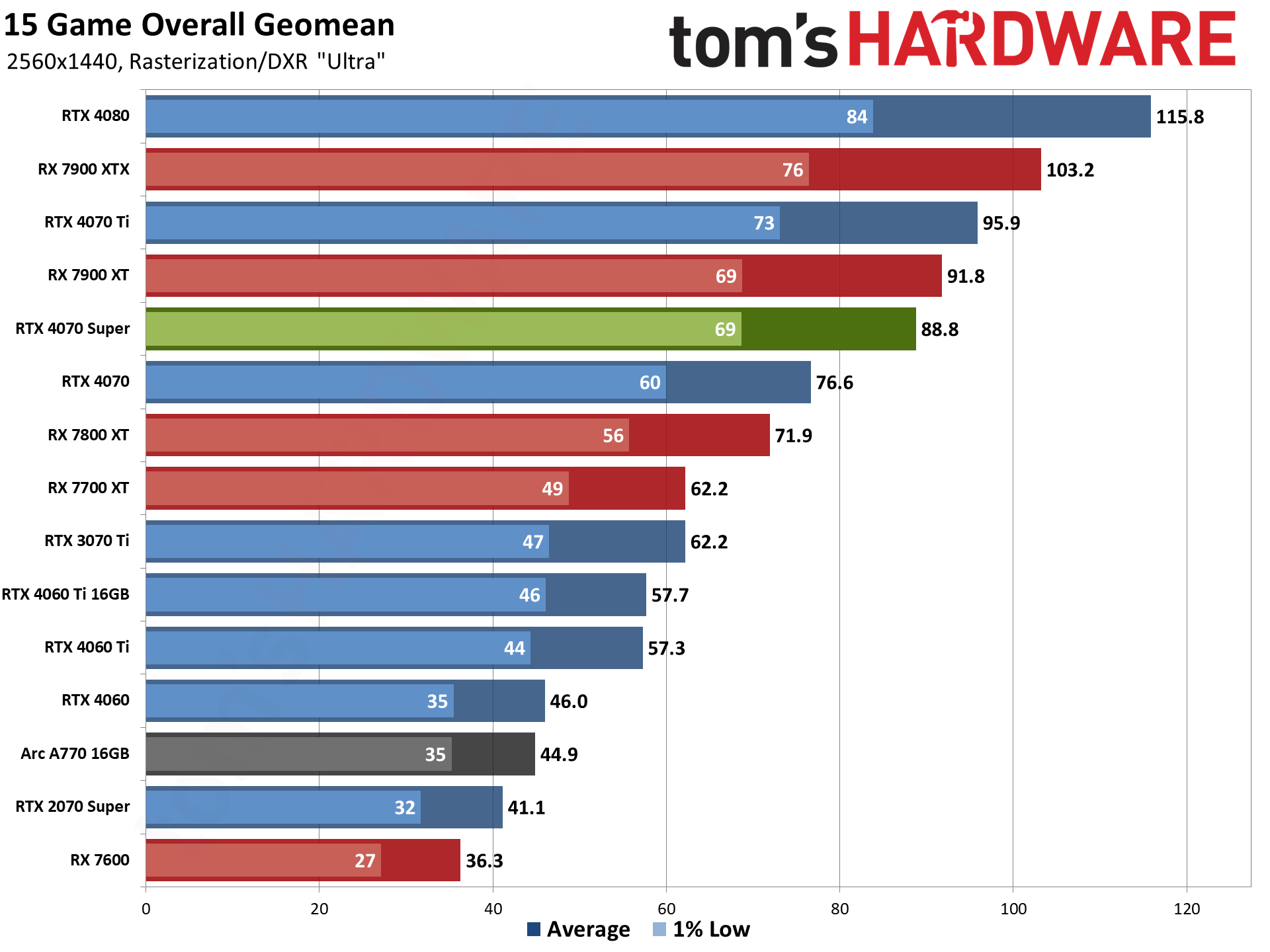
The overall standings are what you'd expect, at least from the Nvidia side of the equation. The RTX 4070 Super ends up 16% faster than the vanilla 4070, and comes in 7% behind the 4070 Ti. We'd be surprised to see anything else, considering the specifications.
It's also interesting to note that all three of those GPUs have the same 12GB of GDDR6X memory and 504 GB/s of bandwidth. The only difference on the memory side of things is that the 4070 Ti and 4070 Super both have the full 48MB of L2 cache while the 4070 has just 36MB, which means the faster cards have slightly more effective bandwidth.
Compared to the last two 70-class 'enhanced' refreshes, the RTX 4070 Super beats the RTX 3070 Ti by 43% overall, and outperforms the RTX 2070 Super by 116% — more than double the performance. If you have a GPU from a couple of generations back, there are plenty of good reasons to upgrade... or you could just wait to see what the RTX 50-series has to offer, probably sometime in the first half of 2025.
Looking at the AMD GPUs, overall the RTX 4070 Super comes very close to matching the RX 7900 XT. That's an impressive feat, considering it uses about 100W less power, has a significantly smaller die size, and comes with 40% less VRAM, and costs about $150 less. Against AMD's next step down, the RX 7800 XT, the 4070 Super delivers 24% more performance, for 20% more money. Naturally, our inclusion of ray tracing games affects the overall score, but that's part of the modern gaming ecosystem and is certainly a factor many gamers are willing to consider.
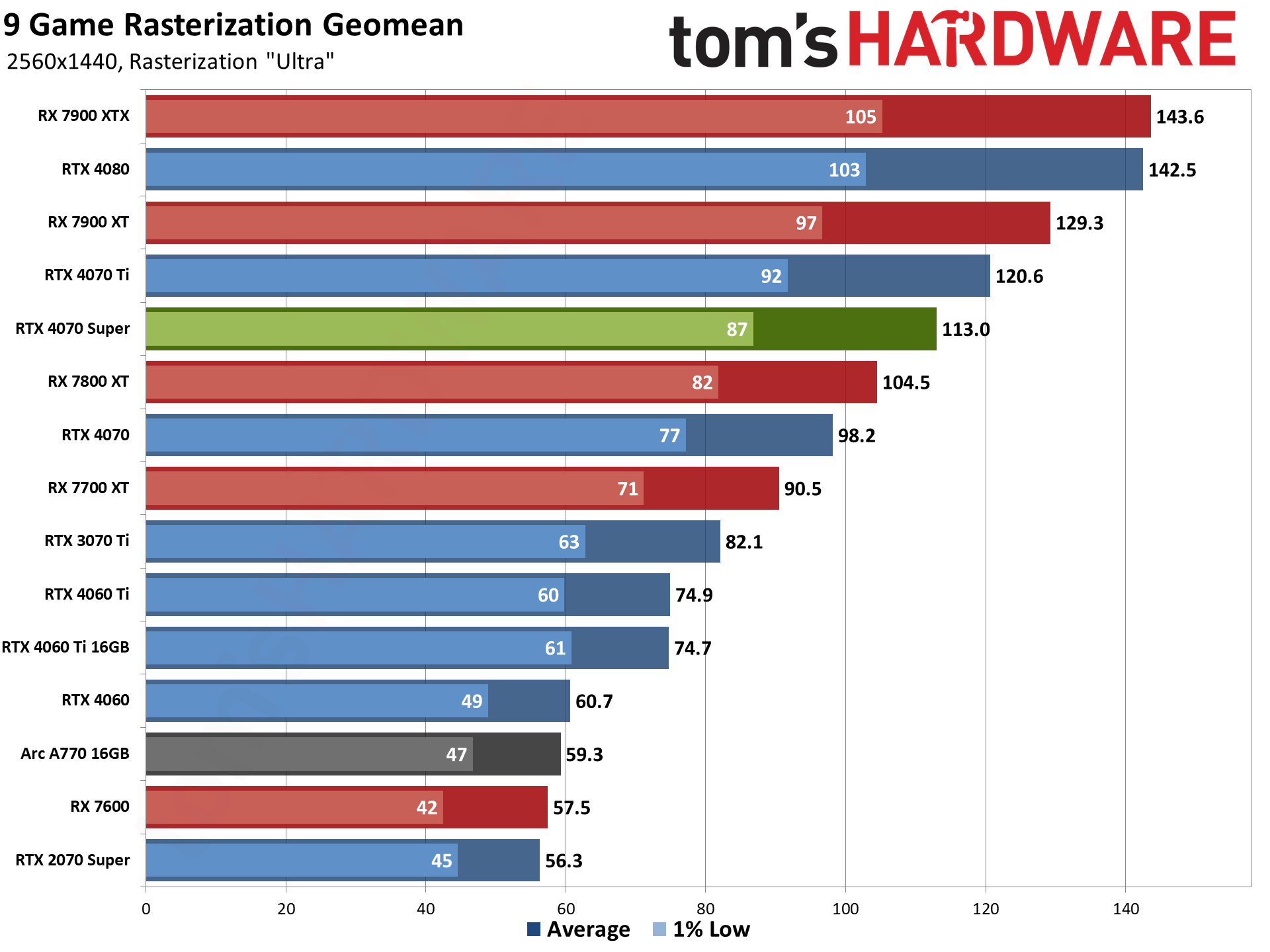
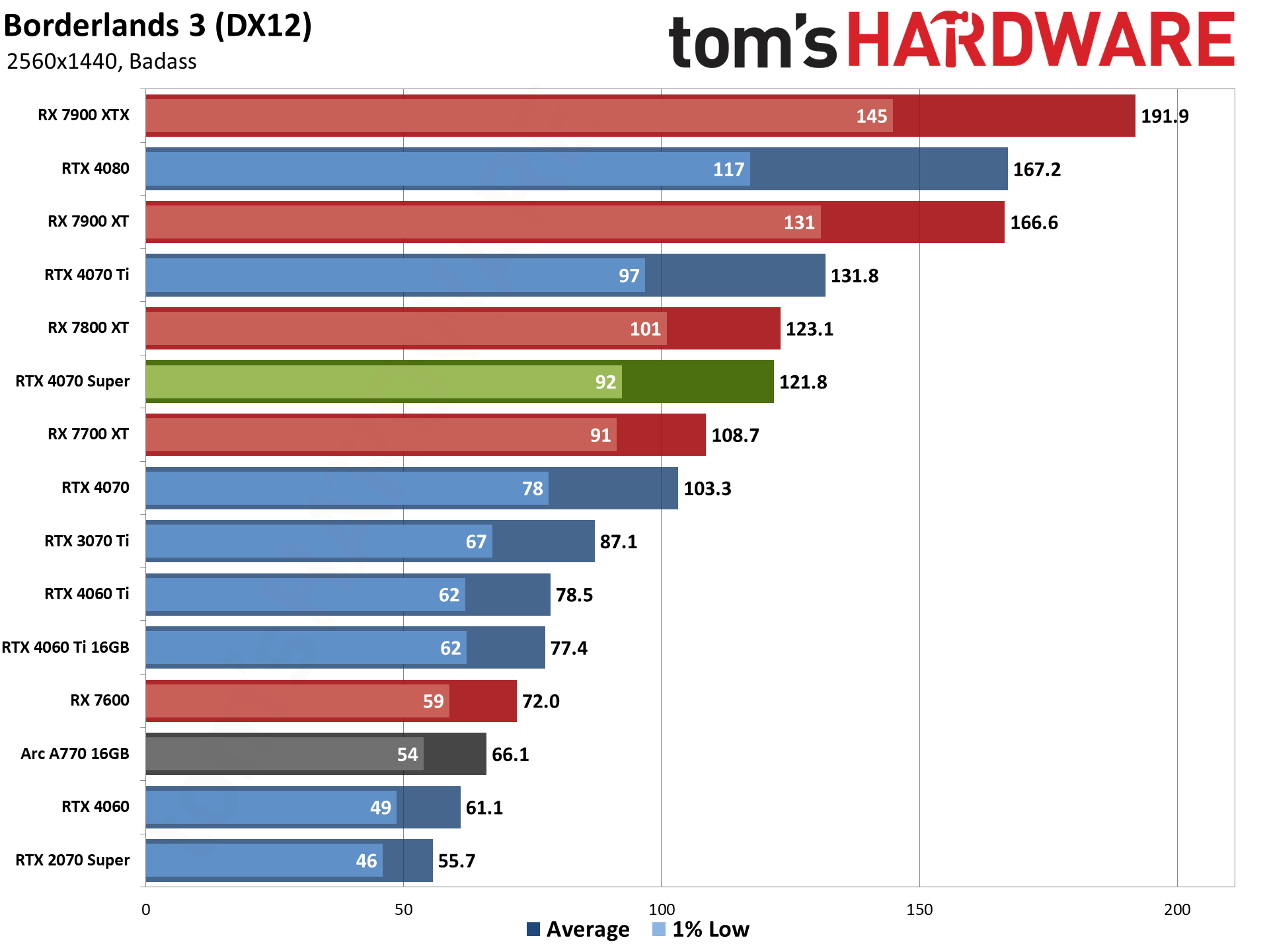
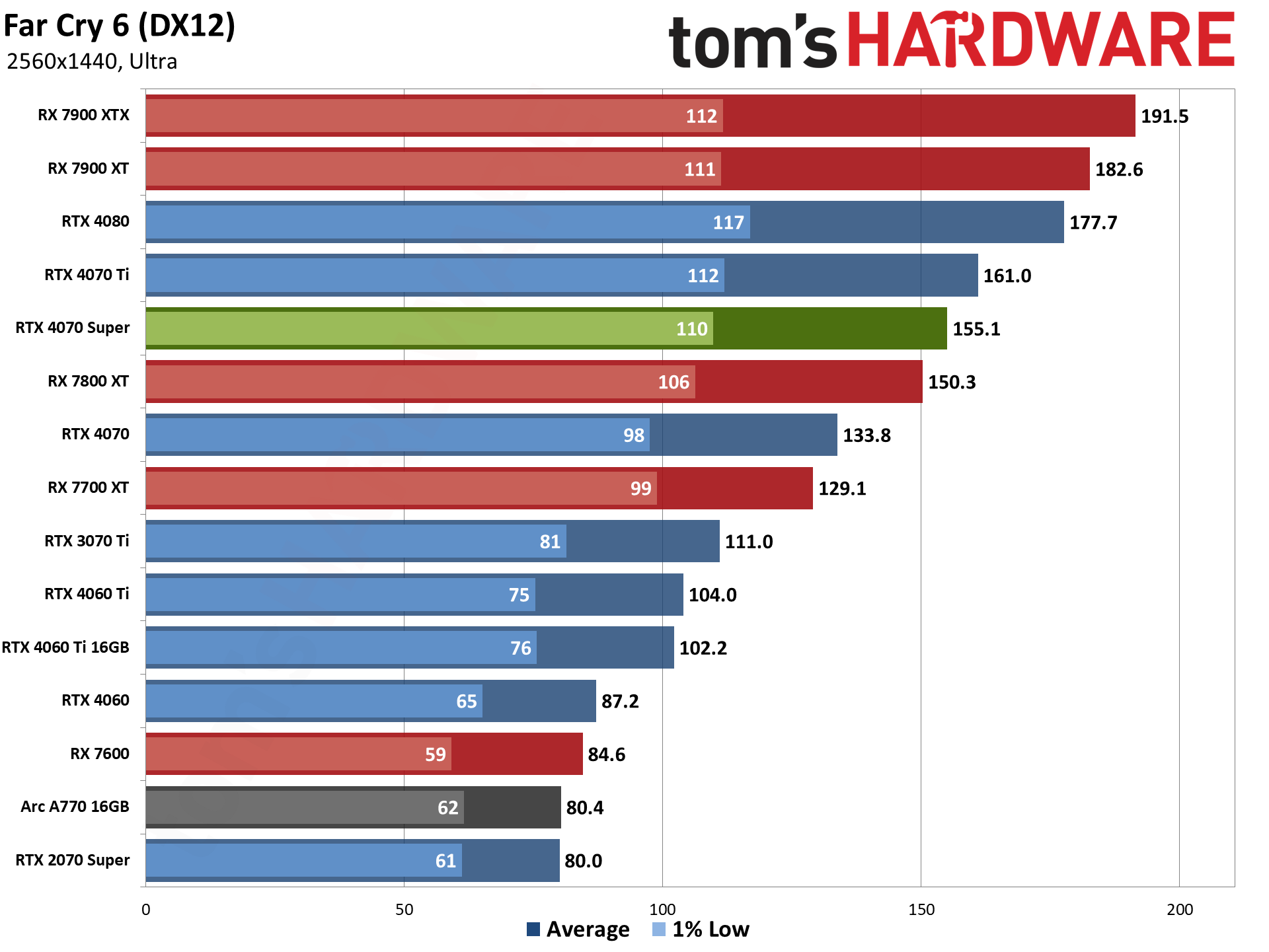
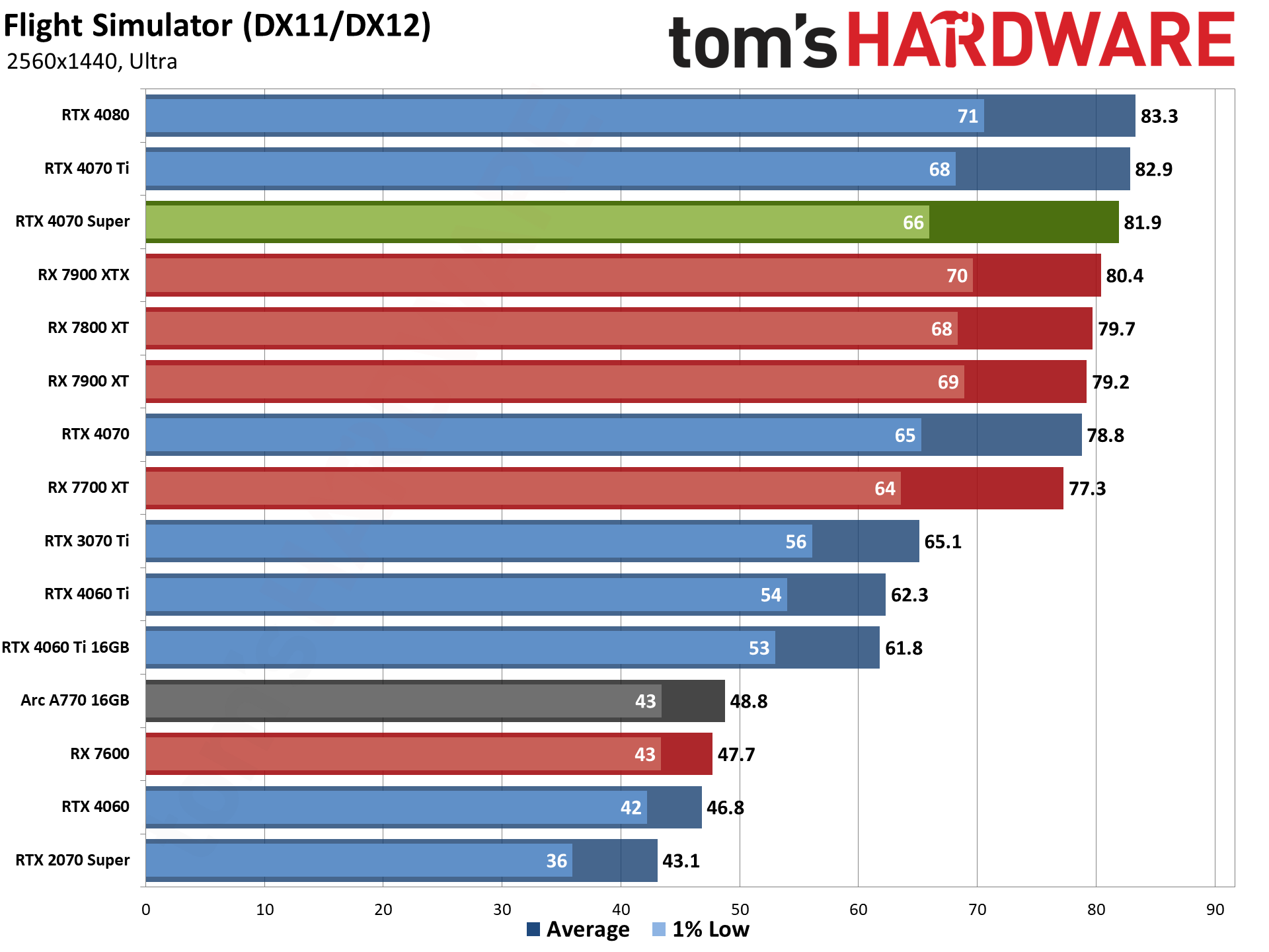
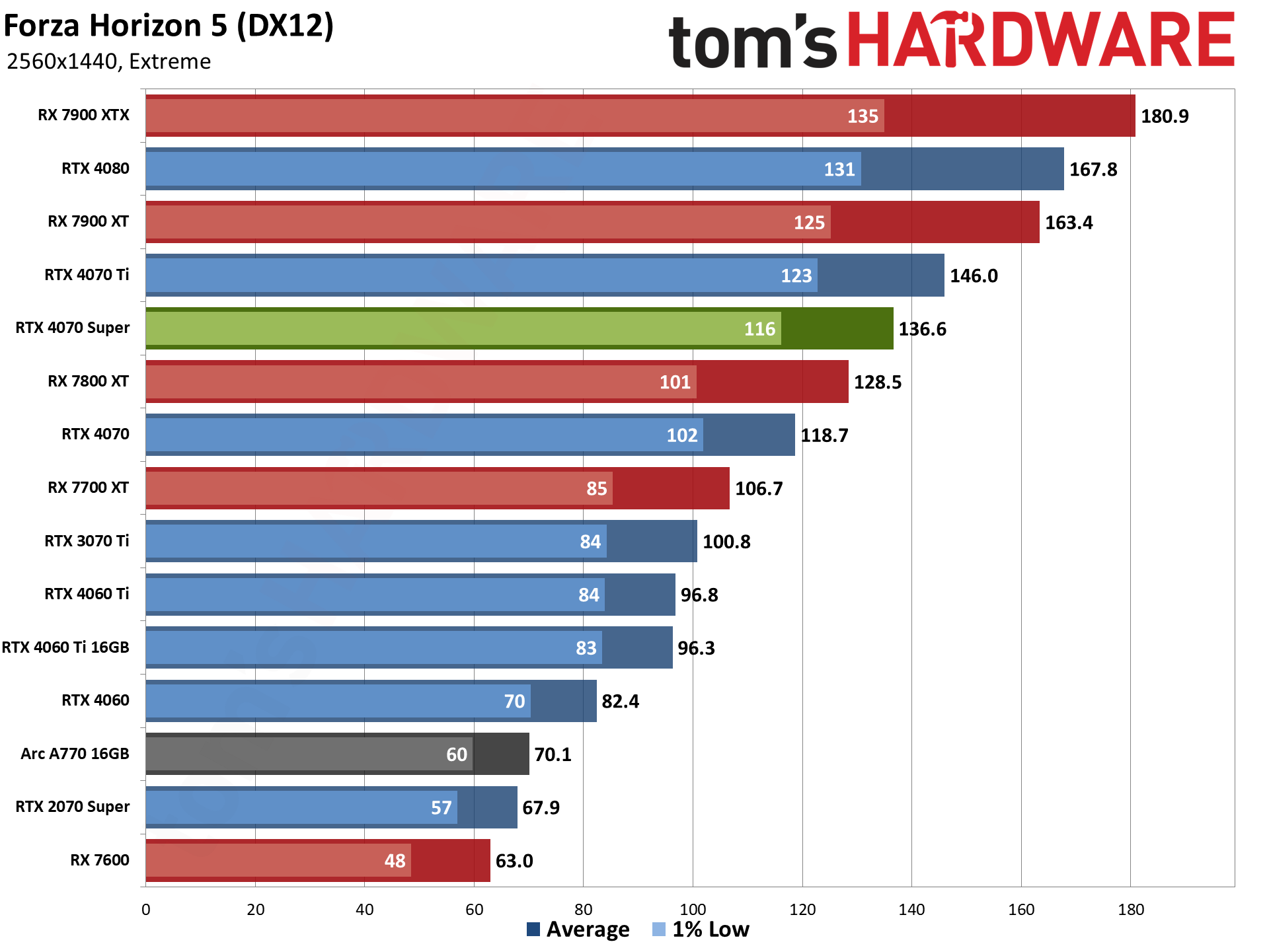
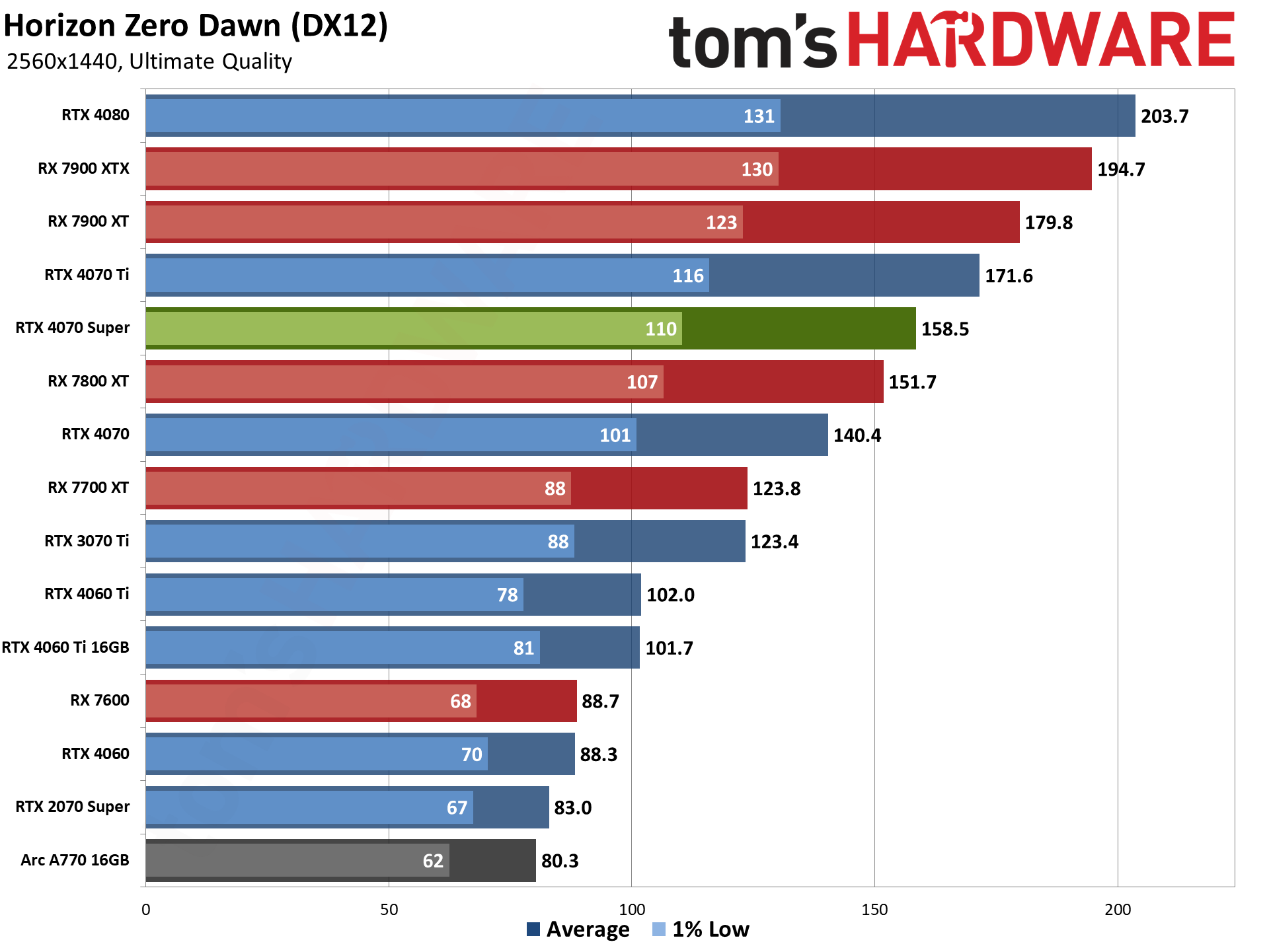
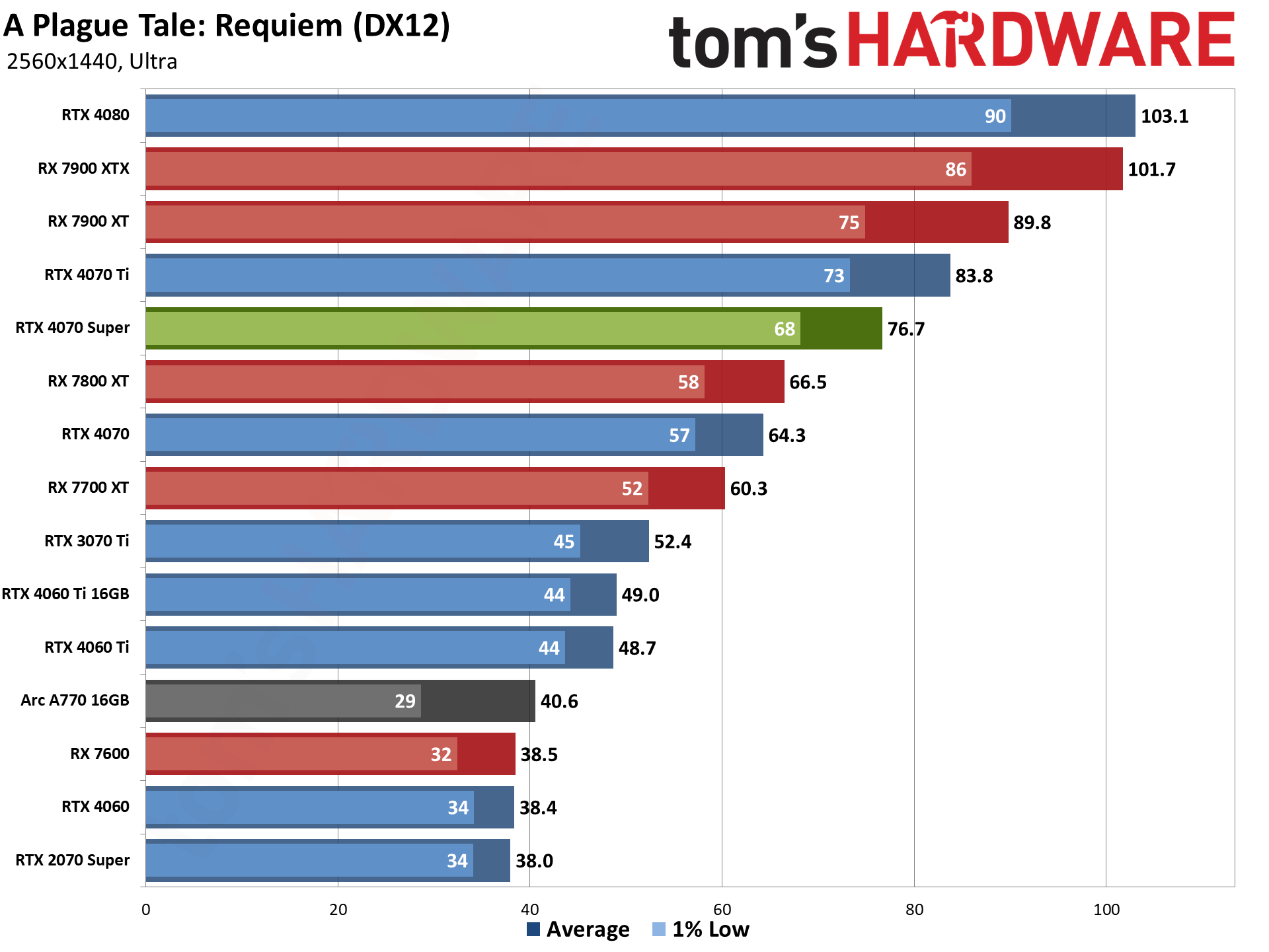
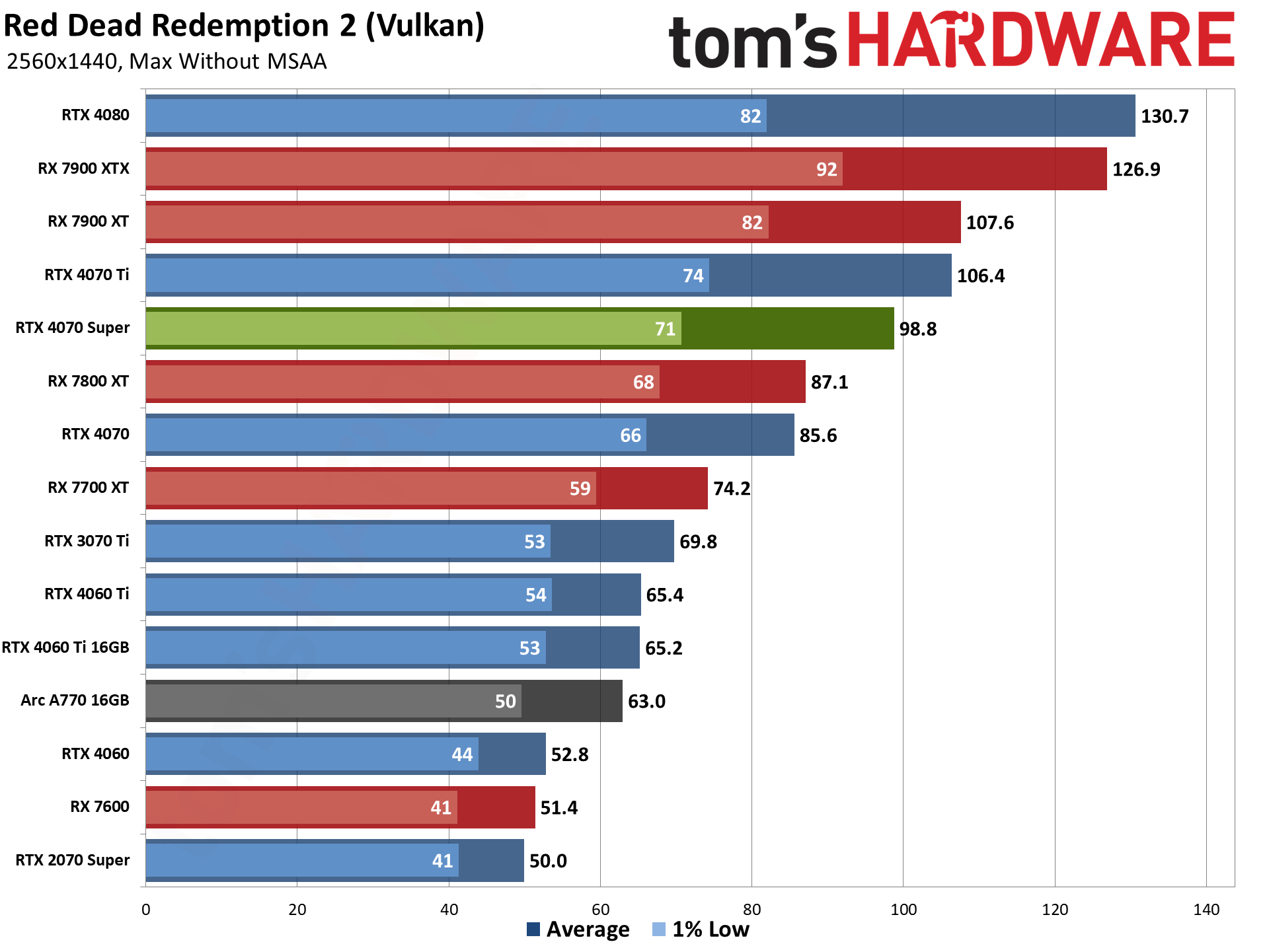
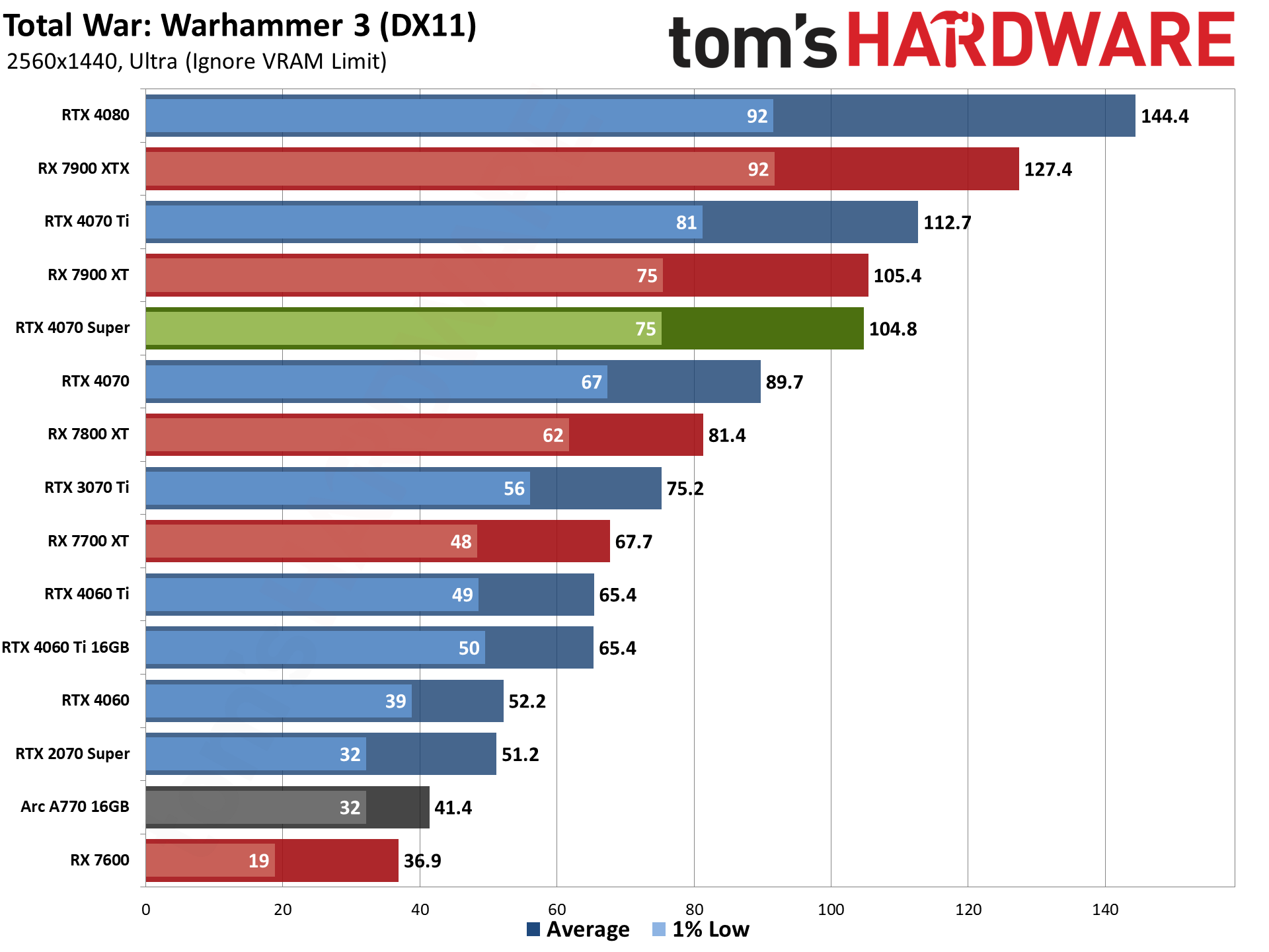
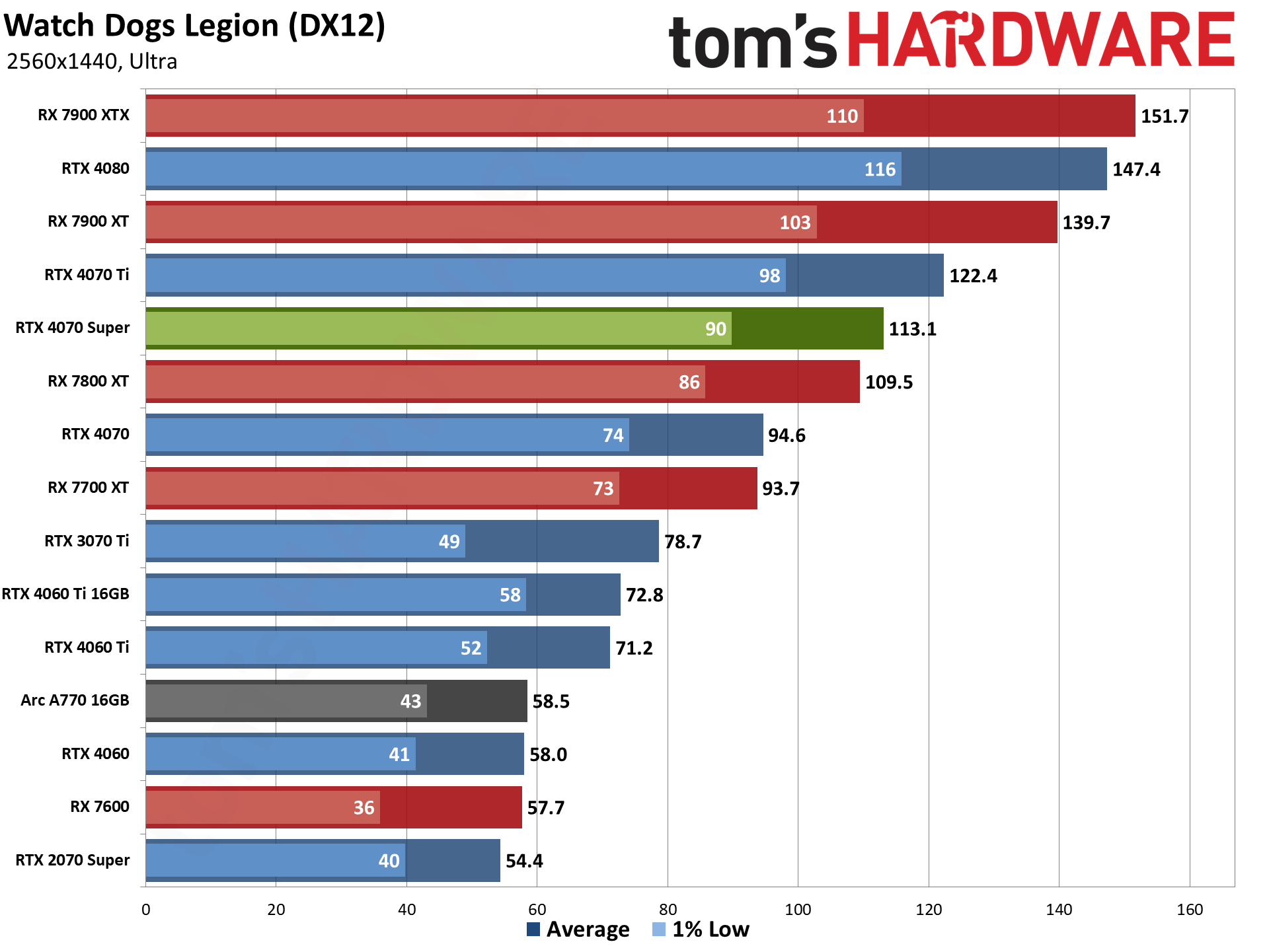
Looking at just the rasterization games in our test suite, the story among the Nvidia GPUs doesn't change much. The 4070 Super is still 15% faster than the 4070, and 6% slower than the 4070 Ti. It's also 47% faster than the 3070 Ti and twice as fast as the 2070 Super.
AMD's GPUs rank higher in rasterization performance, which means the 4070 Super only manages to outperform the 7800 XT by 8%, while trailing the 7900 XT by 12%. We'll look at a more recent rasterization game in our three game bonus benchmarks below.
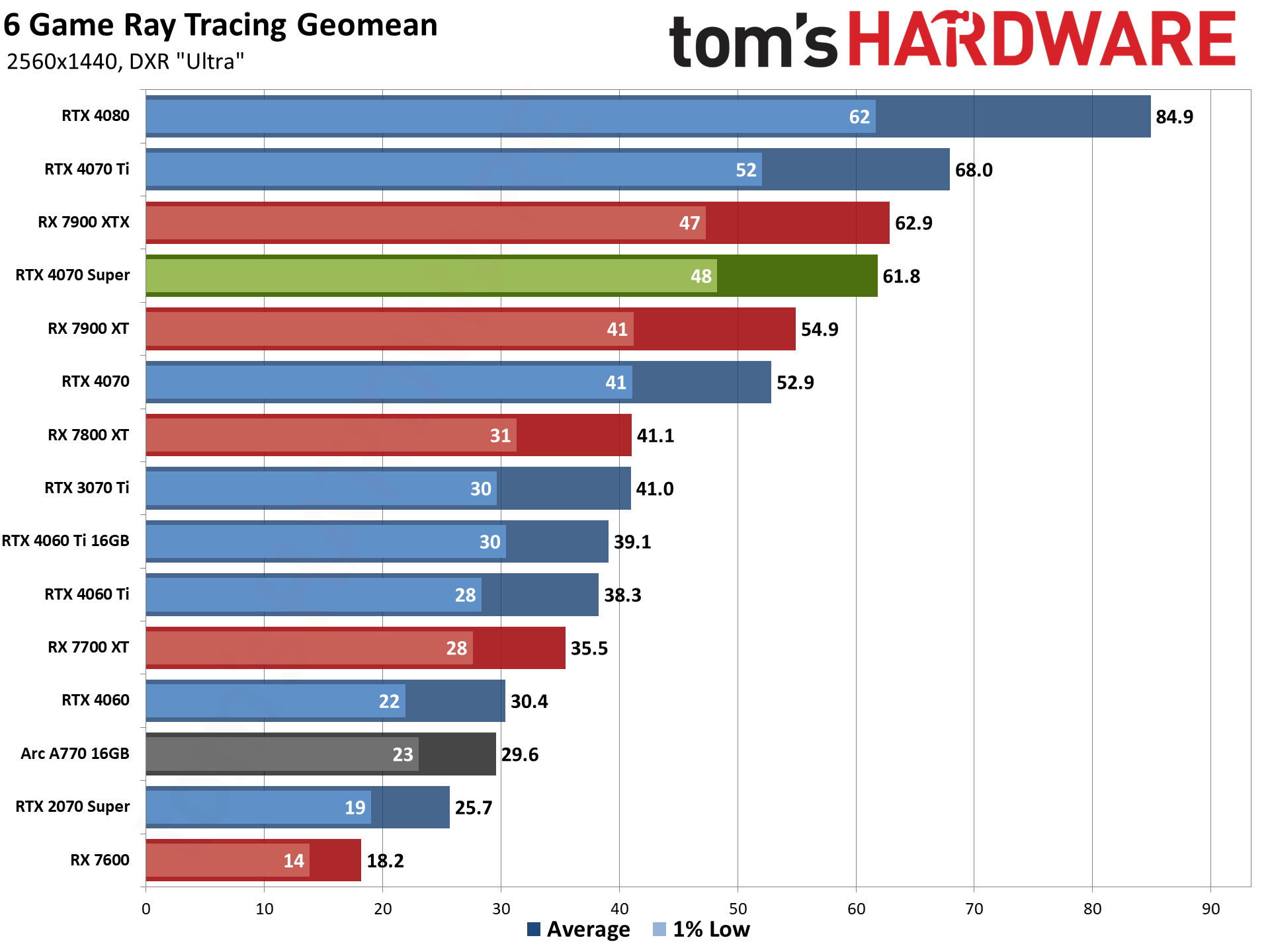
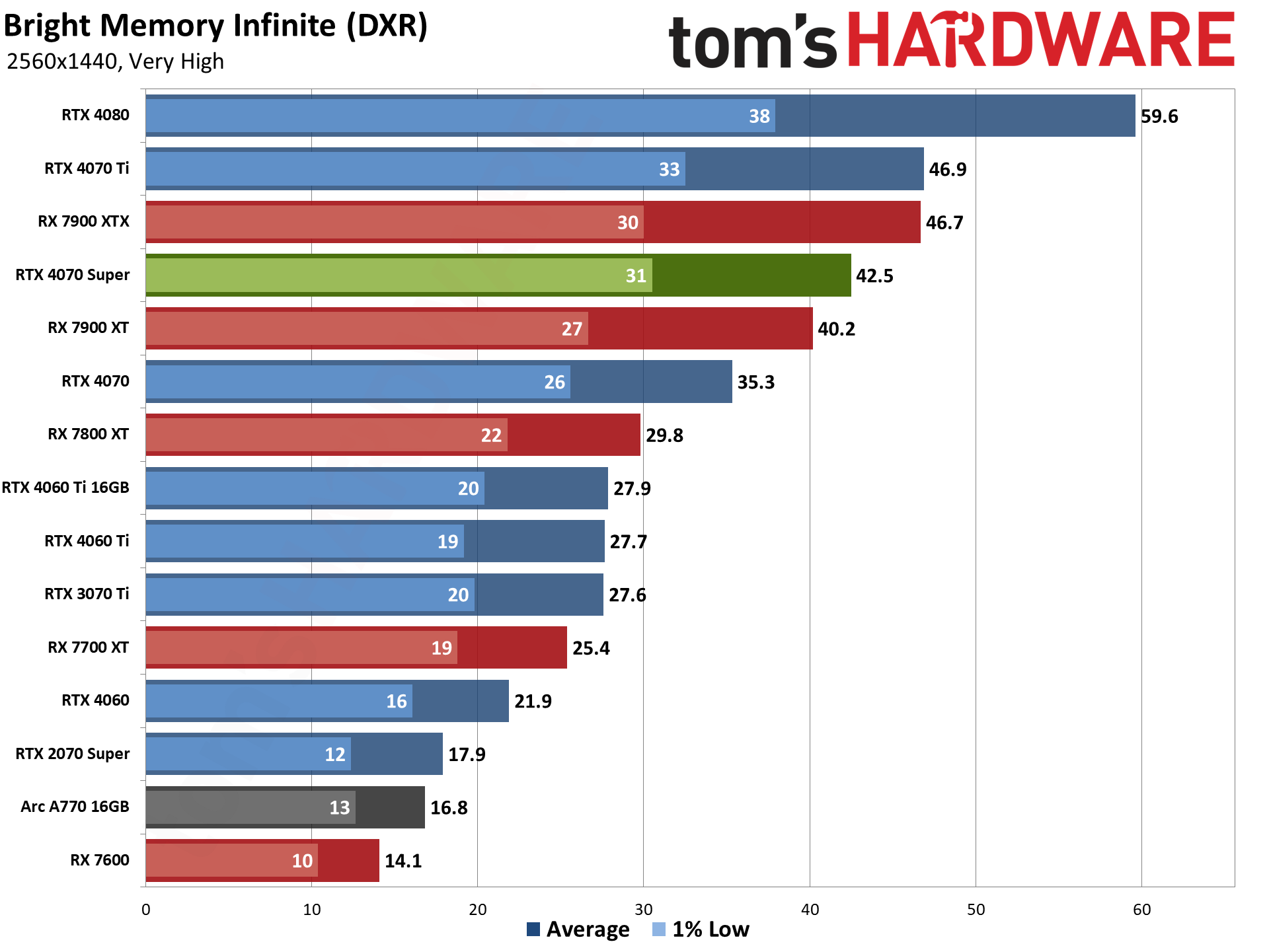
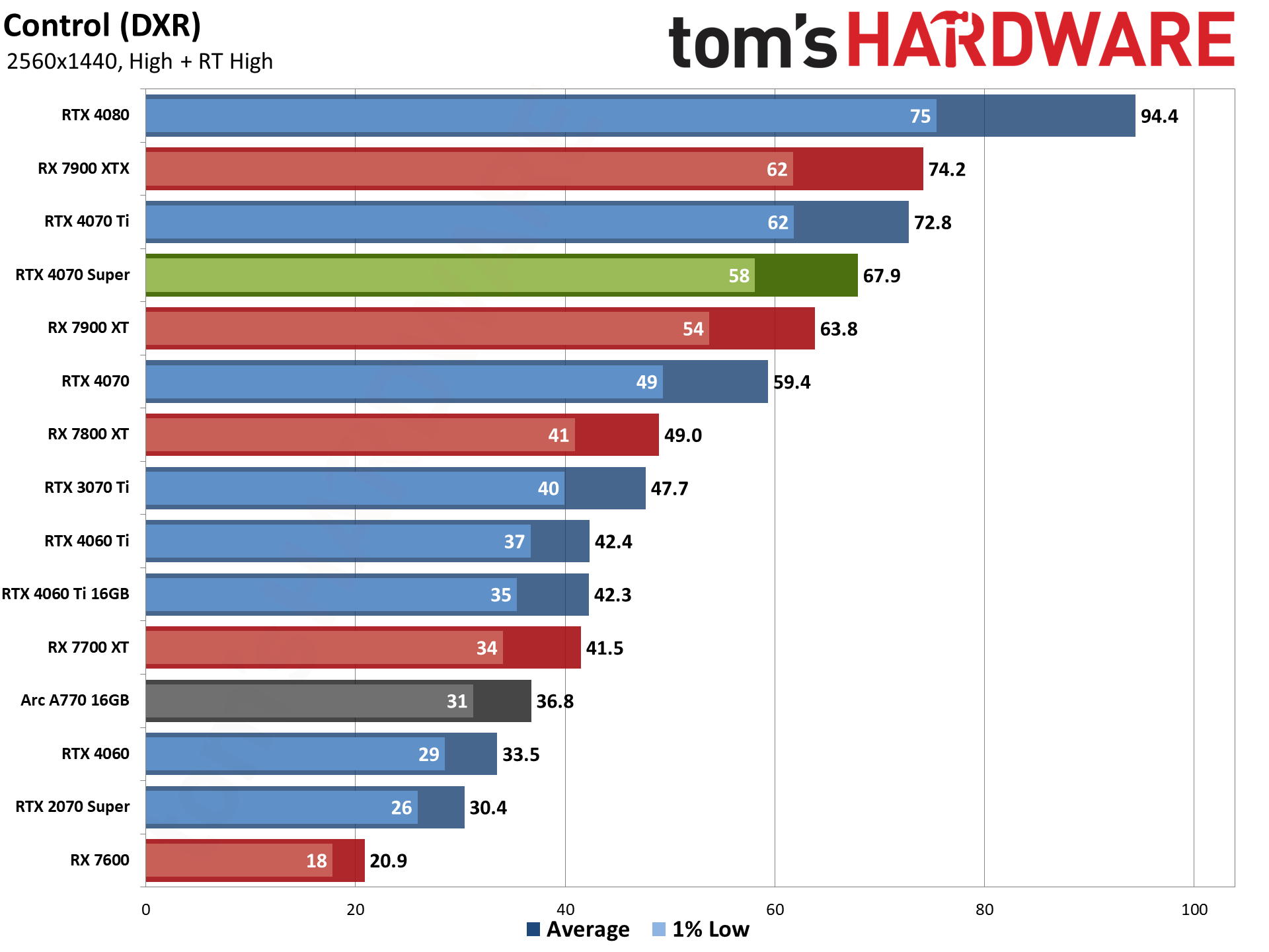
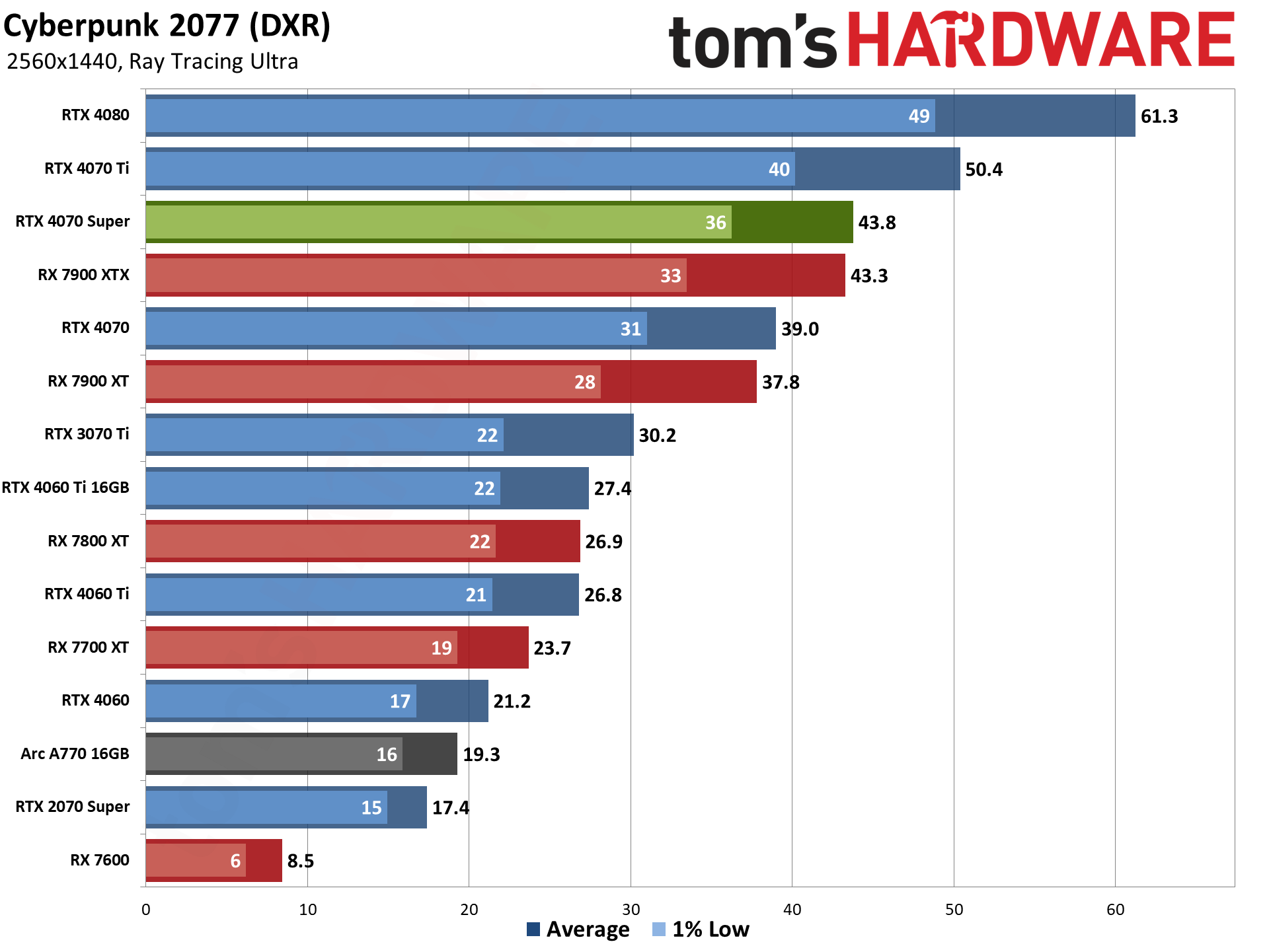
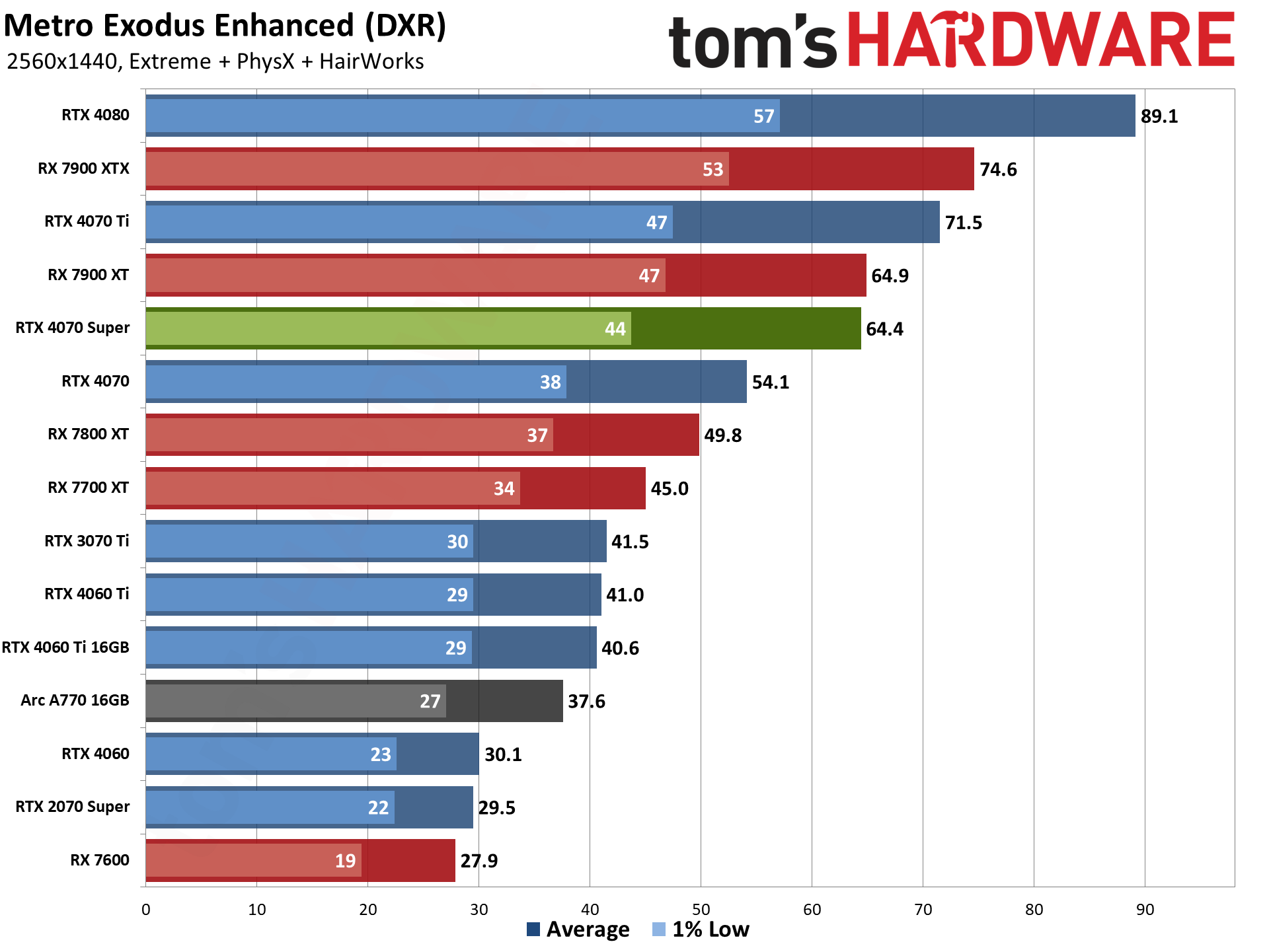
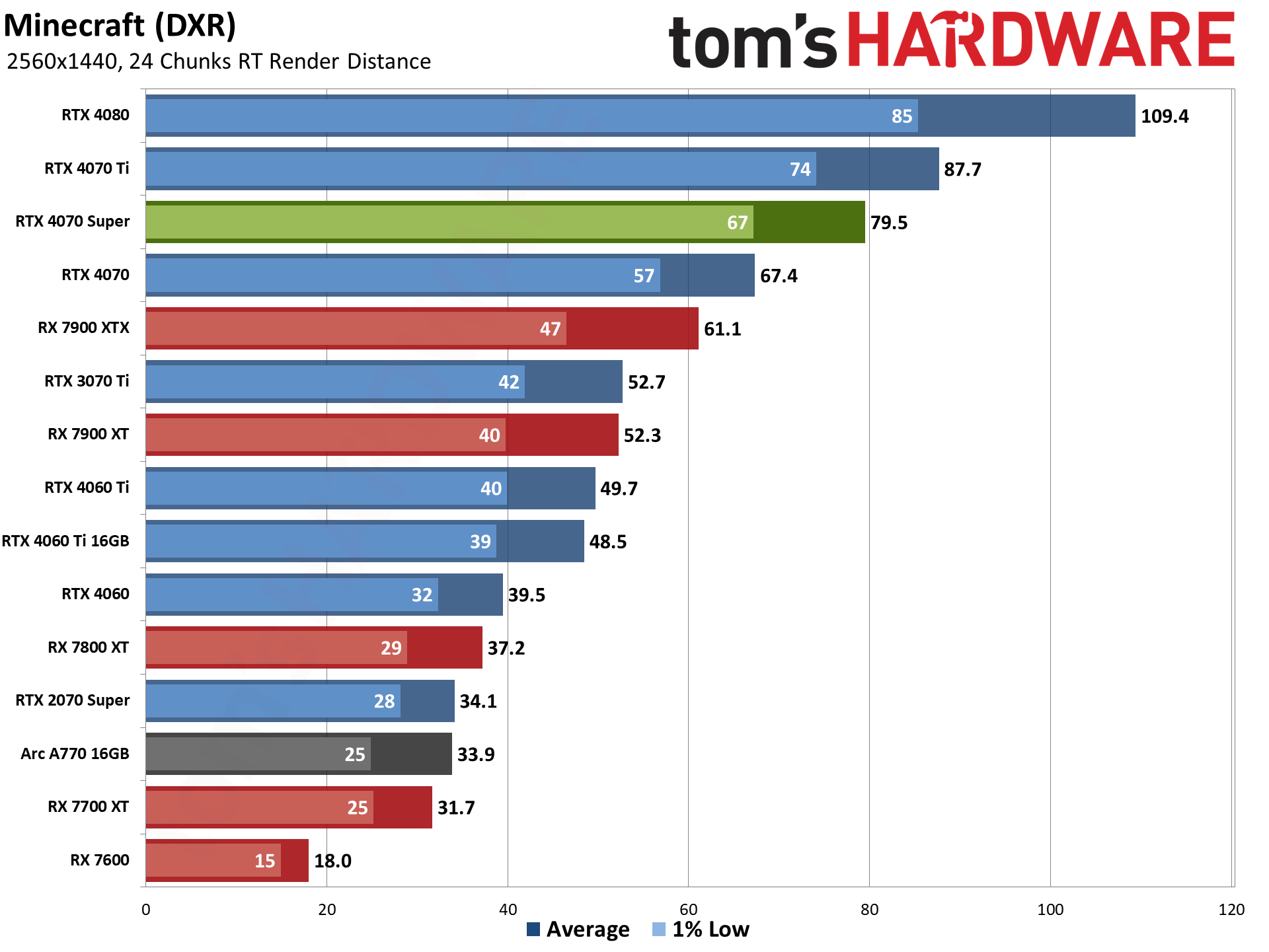
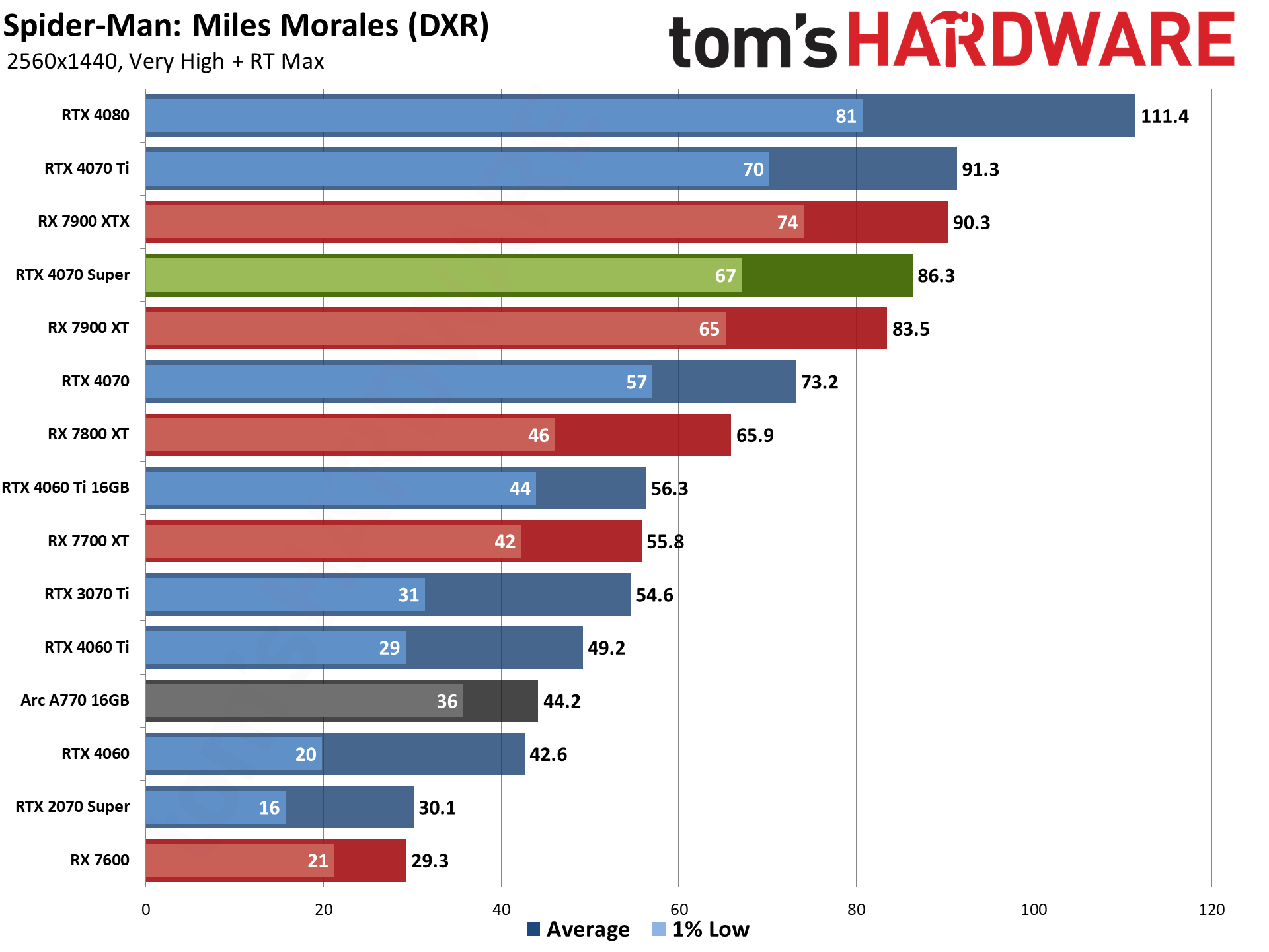
Ray tracing tends to demand more from the compute elements in a GPU, so the 4070 Super leads the 4070 by 17% overall — only a slightly larger advantage, but it does come closer to the 22% increase in theoretical compute. It's also 9% slower than the 4070 Ti — again, in line with the difference in compute performance.
The past two generations of mid-cycle refreshes don't hold up nearly as well in ray tracing performance. The 4070 Super delivers 62% more performance in our DXR test suite compared to the 3070 Ti, and 141% more performance than the 2070 Super. Nvidia has doubled the ray tracing throughput of its RT cores on each generation, which shows up in these results.
AMD's GPUs, as usual, fall far behind their Nvidia counterparts in most DXR games. The 4070 Super nearly ends up tying the RX 7900 XTX, AMD's fastest GPU for now. It's also 15% ahead of the 7900 XT, and 52% ahead of the 7800 XT. This is all without even trying to account for DLSS, which we'll get to next.
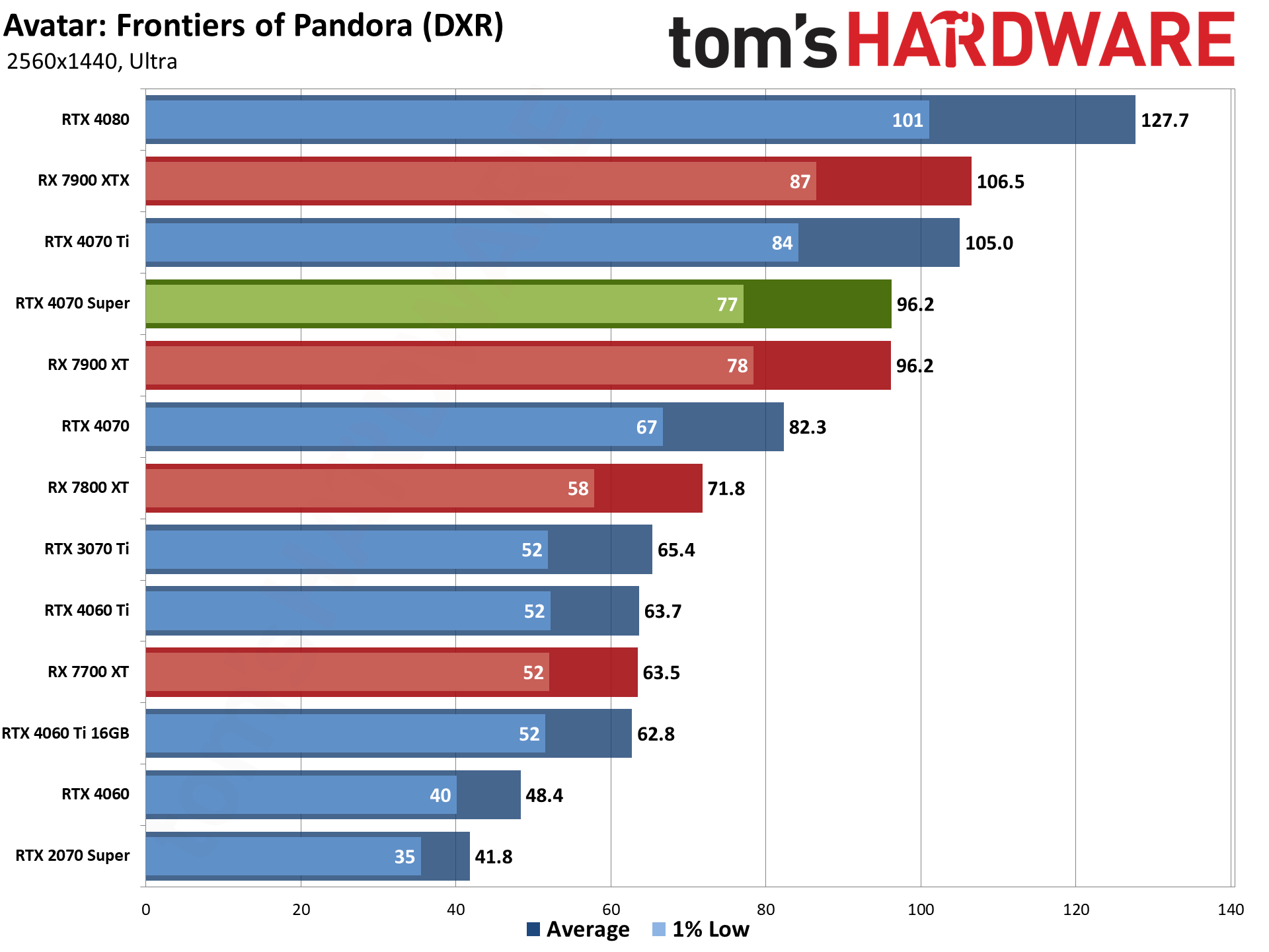
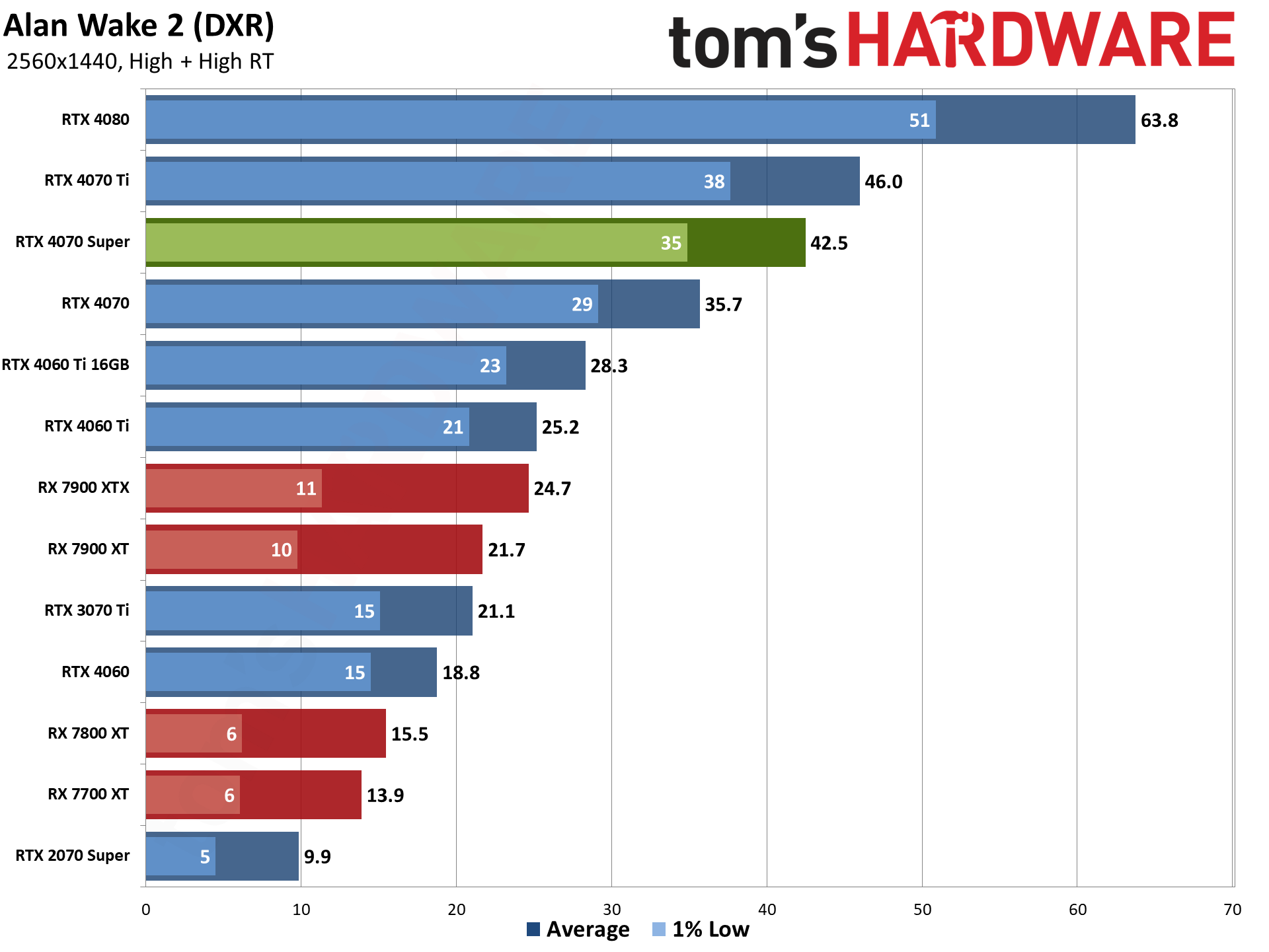
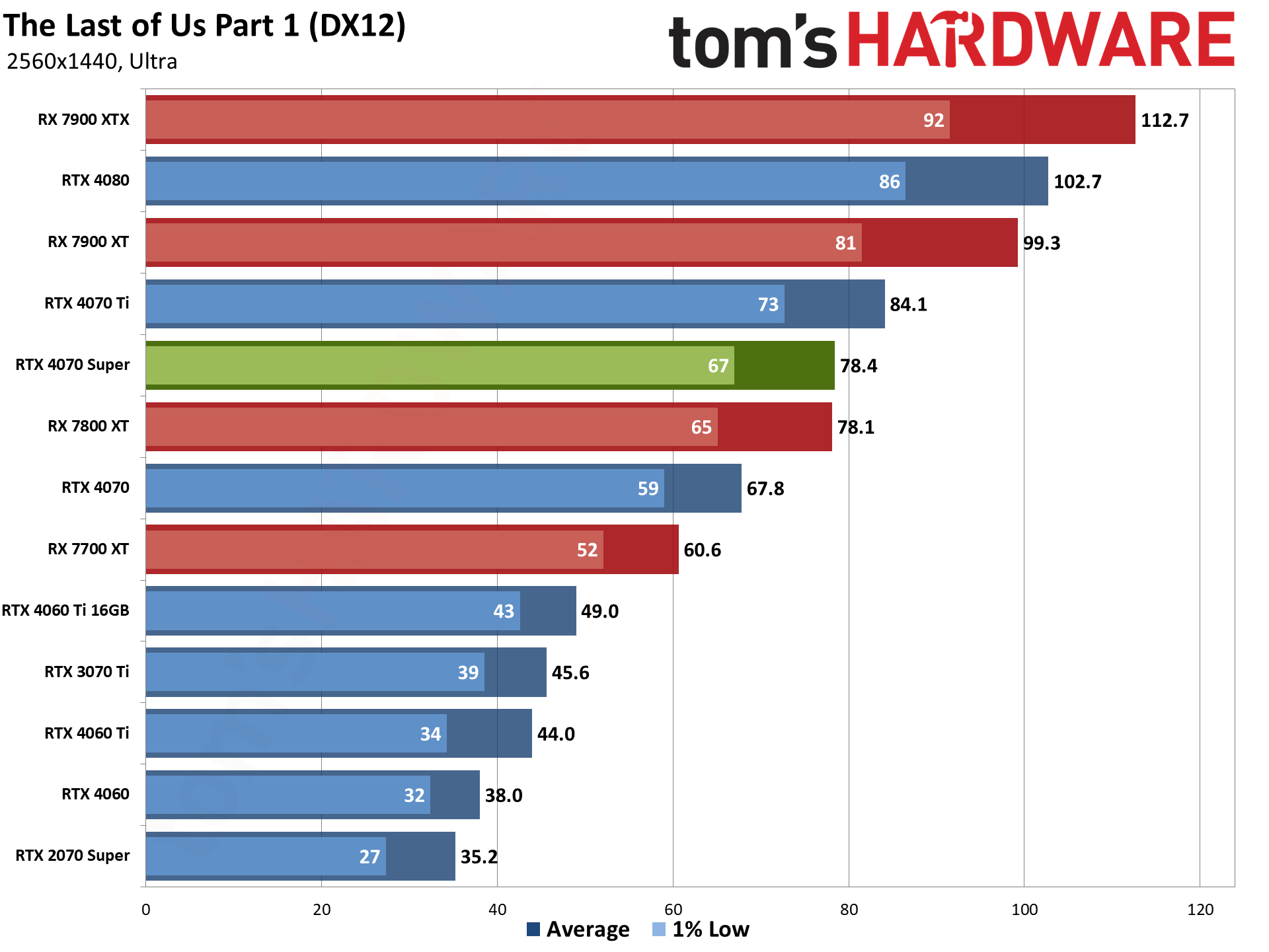
Last up, we have three more recent games that tend to be even more demanding than some of the older games in our test suite. The first is an Nvidia-promoted game, while the other two are AMD promoted games.
Alan Wake 2 uses full path tracing, and it's the most demanding ray tracing game around right now, slightly surpassing Cyberpunk 2077. At 1440p with high settings on both the standard preset and ray tracing, the 4070 Super manages just 43 fps — and that's with Quality mode upscaling (DLSS or FSR2). While that's certainly not amazing, it's still definitely playable, and it's also 72% faster than the RX 7900 XTX.
We retested Avatar: Frontiers of Pandora for this review, using Quality upscaling (DLSS or FSR3) on all GPUs, and it looks like some of the recent game updates have improved performance a bit. The 4070 Super takes up its usual place between the 4070 and 4070 Ti, and this time it's tied with the 7900 XT and 34% ahead of the RX 7800 XT.
Our third bonus game is The Last of Us, Part 1, which has a reputation for needing lots of VRAM. Except, patches since the initial launch seem to have at least somewhat curbed its appetite for memory, judging by how the various cards rank. The 4060 Ti 16GB, for example, is only 11% ahead of the 8GB card — meaningful, but definitely not as punishing as some of the other games we've tested. AMD GPUs do much better this time, with the 4070 Super only managing to match the 7800 XT.
- MORE: Best Graphics Cards
- MORE: GPU Benchmarks and Hierarchy
- MORE: All Graphics Content
Get Tom's Hardware's best news and in-depth reviews, straight to your inbox.
Current page: Nvidia RTX 4070 Super: 1440p Gaming Performance
Prev Page Nvidia GeForce RTX 4070 Super Review Next Page Nvidia RTX 4070 Super: 1080p Gaming Performance
Jarred Walton is a senior editor at Tom's Hardware focusing on everything GPU. He has been working as a tech journalist since 2004, writing for AnandTech, Maximum PC, and PC Gamer. From the first S3 Virge '3D decelerators' to today's GPUs, Jarred keeps up with all the latest graphics trends and is the one to ask about game performance.
-
Gururu So they squeeze out a few more FPS to beat the 7800xt and charge $50 more. The price games are maddening.Reply -
AgentBirdnest Mostly what I was expecting... but wow, those results against the 7800XT at 1440p are kinda crazy. +24% for the whole suite, and about +50% in the RT-only results? AMD really needs to rethink the price of the 7800XT.Reply
Interesting results, and interesting article (so far. I look forward to the rest. Hope you get some good sleep until then, Jarred. :))
I'm curious to know how well it overclocks. Can it match the 4070 Ti? -
atomicWAR While a step in the right direction, the ram capacity is still really underwhelming but the performance is promising. The 4070 series (Ti, super or otherwise) should have come with 16GB while the 4080 series should have had 20GB...This gen, save the 4090, has been really disappointing. Cost increases (70/80 series) with underwhelming performance (60/70/80) have been fairly pervasive in the product stack. I hope this helps things...I am interested in the 4070 Ti Super as many of my nephews and nieces have been wanting to upgrade this gen and thus far it has been hard to recommend anything other than the 4090 to them which is out of their budgets by about 700 dollars give or take a hundred.Reply -
Tom Sunday Reply
12GB of 4070 SUPER bliss? That is the million dollar question? At this point in time I would expect more than 12GB of VRAM in especially 2024. Even a 1080ti already had 11GB of VRAM in its side pocket. Will it pay in holding-out for a 4070 Ti SUPER: 2.5X Faster than the RTX 3070 Ti and sporting a mouth watering 16GB of GDDR6X? With that along bolstering CUDA cores, VRAM and reaching 4K gaming heaven? Will in fact a 4070 Ti SUPER be essentially a slight cutdown of the original RTX 4080, meaning that one can expect to see similar performance from the two cards?Gururu said:So they squeeze out a few more FPS to beat the 7800xt and charge $50 more. The price games are maddening.
Overall and in my very limited view the ‘4070 Super Refresh’ series is indeed a welcomed addition. It's commendable that the Super’s overall offer much better ray tracing performance, better energy efficiency and generally a notable performance upgrade compared to the Non-Super cards. No question that NVIDIAs latest 'Super-Play' will certainly put AMD under greater pressure, because they offer more performance and efficiency for basically the same price points. On the flipside I understand that the 4070 Super Refreshes do give the impression that they are only a mid-cycle gap filler. Because of the price? Further if AMD would only lower the price of the 7800XT, many I think would still go for the XT. In some instances AMD reputably has long preferred to stake a few cards at higher prices than to gain market share through price reductions. Food for thought! -
pocketdrummer Toms Hardware needs to do a price to generation performance uplift chart. Use performance uplift as the tier and not the actual product names (xx70 and xx80 mean nothing now). I'm sure we'll see that the price has gone up and the performance uplift has not tracked.Reply -
kyzarvs Call me a luddite as I remain on a venerable 1080ti, but I'm not sure I would trust laying down £600 for a 12GB card today and hoping it works as well as far into the future as my current card has. While it may be okay today, when it's as old as my 1080ti is now, I think 12GB will be a massive limitation.Reply -
Alvar "Miles" Udell At this point I'd have to tell people that unless they have a pre-RTX 2000 series card to wait for the 5000 series. Yes the 4070 Super is a solid 4K60 and 1080p144 (and a case by case basis 2560x1440 120fps) card, but you're still dealing with 12GB VRAM and a very unnecessary 16 pin power adapter for $600+ in an era of horrible economics.Reply -
logainofhades ReplyAgentBirdnest said:Mostly what I was expecting... but wow, those results against the 7800XT at 1440p are kinda crazy. +24% for the whole suite, and about +50% in the RT-only results? AMD really needs to rethink the price of the 7800XT.
Interesting results, and interesting article (so far. I look forward to the rest. Hope you get some good sleep until then, Jarred. :))
I'm curious to know how well it overclocks. Can it match the 4070 Ti?
That 24% is only due to RT. If you look at pure raster performance, the gap is much smaller. Definitely not worth the $90 ish price premium, unless you truly care about RT, which I personally do not.
-
subspruce Reply
No, ofc not. Nvidia pushes their chips to the max that they can without having more not-up-to-requirements GPUs than can be offloaded as some kind of China Quadro.AgentBirdnest said:I'm curious to know how well it overclocks. Can it match the 4070 Ti? -
oofdragon Only in Toms Hardware fairy tale land the 4070 matches the 7800xt in raster, everywhere else the 4070Ti ties with it. This website is a jokeReply
